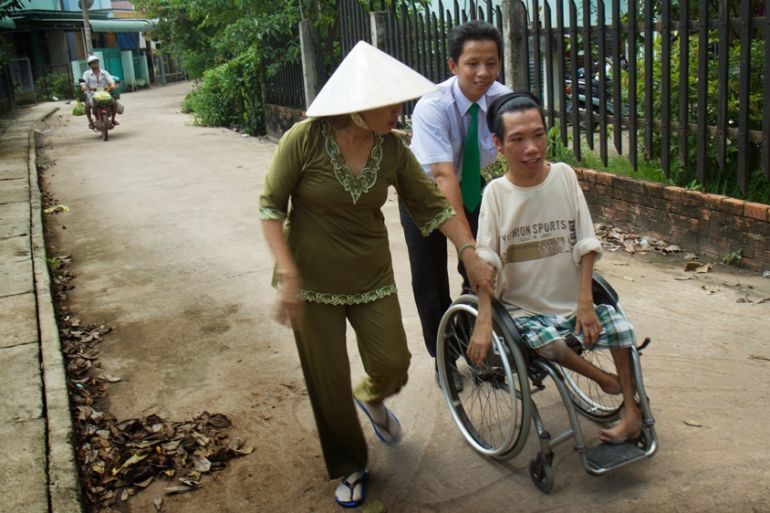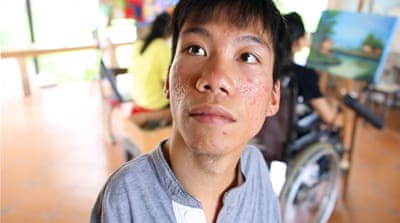
Chau, Beyond the Lines
We follow a Vietnamese teenager disabled by Agent Orange as he struggles to realise his dream of becoming an artist.
Editor’s note: This film is no longer available online.
More than 40 years after the fall of Saigon, the scars of the Vietnam War are still visible.
Keep reading
list of 4 itemsRussia-Ukraine war: List of key events, day 783
UN’s Libya envoy resigns citing no hope for political progress
The Take: Remembering one year of war in Sudan
Born in the Agent Orange hot spot of Dong Nai, in 1991, Chau has a rare disability caused by Dioxin – the chemical found in Agent Orange.
During the Vietnam War, the United States is estimated to have dropped more than 70 million litres of chemicals on to the dense jungles of the country in order to rid the Northern Vietnamese army of their food and cover. Unknowingly, Chau’s mother drank from a contaminated river while pregnant with him.

With his family unable to care for him, he grew up in Lang Hoa Binh Peace Camp with many other children also disabled by exposure to the toxin. It was here that he was taught to cope with his disabilities until the age of 17.
Finding his passion for drawing at an early age, Chau realised he wanted to make a career in art his calling. But he was told such a high-reaching goal for a person with such physical setbacks was impossible.
Over the course of seven years, he managed to defy all odds and obstacles and, at the age of 25, he is a freelance artist painting with oils on cloth canvas, entirely with his mouth. He believes his original paintings have soul.
Filming over several years, we follow the journey that this young man makes to survive, and even thrive as he works to become an artist and fulfil his dreams.
Watching as he navigates daunting challenges, we see the effect and legacy of the devastating war between Vietnam and the US and the incredible will it takes to overcome that legacy.
![Vietnam says Agent Orange has caused more than 400,000 deaths and more than three million cases of cancer and other health problems [Courtney Marsh/Al Jazeera]](/wp-content/uploads/2016/02/3e8313abba164fe7b0e1e5c02cfd17e2_18.jpeg)
FILMMAKER’S VIEW
By Courtney Marsh
In 2007, I was an undergraduate documentary student at UCLA’s School of Theater, Film, and Television. I had never made a movie before, but I wanted to document something very different from the experiences of my own life. I wanted to explore. My good friend at the time was Vietnamese and, to cut a long story short, I decided to make a feature-length documentary (I didn’t even know documentary short films existed) on the street kids of Ho Chi Minh City. So with a few grants, donations, and some savings, we went over to Vietnam to begin filming.
Because we had to get permission from the government to legally shoot in Vietnam, word got around, and a Vietnamese television producer met us at our hotel. He thought our subject matter was fine, but trite, so he offered to take us to a “peace village” tucked away in the back of a maternity hospital. This peace village was Lang Hoa Binh: a care centre for kids disabled by the chemical Agent Orange.
I had just turned 21 and had no idea what Agent Orange was. When I researched it, I realised it was a chemical sprayed by US troops during the Vietnam War to defoliate the forests, and that these children had been disabled by it – generations later.
We decided to volunteer at the care centre for two weeks. Every day I would finish helping to bathe and feed the younger children, and then I would take off and go play soccer with the older kids (Chau included). This is when I noticed that these kids were just kids. They never saw themselves as different. It was the outside world who saw them differently. I realised this was the story, the perspective I wanted to explore.
![The US dropped about 70 million litres of Agent Orange on Vietnamese jungles to remove cover for communist forces [Courtney Marsh/Al Jazeera]](/wp-content/uploads/2016/02/027287c76a3c449292fade1a43685a6c_18.jpeg)
After two weeks, we started bringing the cameras along and initially I wanted to make a feature film about five of the kids, at different ages, growing up in the care centre, but I eventually decided to focus on Chau because of his passion and dynamic personality.
He knew exactly what he wanted to do at age 15 and he wouldn’t take “no” for an answer. Maybe because I too was trying to prove myself as a filmmaker, I personally related to him. But overall, I just realised Chau’s arc needed the focus. Chau’s story is something we all go through: growing up, wrestling with our dreams and demons, wondering how our lives will turn out.
When I got back to the United States, I thought I would finish my film by the end of the year, but my friend decided he didn’t want to pursue the project any more and I was left trying to fill in the blanks. This led me down a long road of hiring translators. That delay took me into the next chapter of Chau’s life, and I realised the story wasn’t over. In fact, I had no idea that it would take another seven years to capture the ending of the film and to see Chau flourish.
Over the course of these eight years, Chau taught me that if we focus on what we have rather than what we don’t have, perhaps we too can achieve the seemingly impossible. That perseverance and persistence does pay off despite our setbacks.
And above all else, Agent Orange is not an issue of the past. It is very much one of the present and still affects millions in Vietnam and the US today. This is a humanitarian issue we can do something about. I suggest raising awareness via social media and writing to your governing officials about continuing the clean-up in Vietnam. Together we can try to protect the futures of later Vietnamese generations.